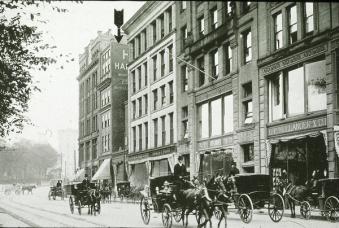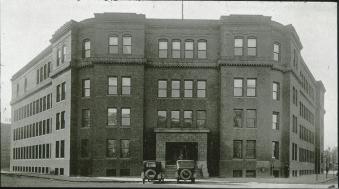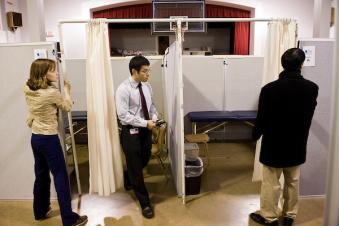-
About
- Departments & Offices
-
Academics
- Public Health
- Biomedical Sciences
- Physician Assistant
- Special Master’s (MBS)
-
Admissions & Financial Aid
- Tuition & Fees
-
Student Experience
-
- Student Resources by Program
- Academic & Student Support
- Wellness & Wellbeing
- Student Life
- Events & Traditions
-
-
Research
- Research Labs & Centers
- Tufts University-Tufts Medicine Research Enterprise
-
Local & Global Engagement
- Pathway & Enrichment Programs
- Global Health Programs
- Community Engagement
History of Tufts School of Medicine
1893
Tufts College Medical School opens at 188 Boylston Street in Boston. The first-year class is more than 25 percent women.
1894
The Boston Dispensary—the city’s oldest hospital, founded by Paul Revere and Sam Adams—and Suffolk Dispensary become the first teaching affiliates.
1900
After a stopover at the corner of Rutland and Shawmut avenues, Tufts College Medical School moves to 416 Huntington Avenue. The cost of the building and land was $167,000.
1905
Josefa Zaratt, M1905, one of the first African-American women admitted to medical school at Tufts, graduates.
1929
The Boston Dispensary, Boston Floating Hospital (founded in 1894), and the Trustees of Tufts College form an alliance to establish the New England Medical Center.
1931
The first regional medical program in the country brings physicians and patients from rural Maine to New England Medical Center and sends students and faculty to Maine hospitals.
1943
In the middle of World War II, four out of five students are funded by the government and wear either an Army or Navy uniform.
1948
Samuel Proger is appointed chair of the Department of Medicine at Tufts and physician-in-chief at the New England Medical Center; he held both positions until 1971.
1949
The school renovates former garment factories at 120 and 136 Harrison Avenue for its new home.
1954
Tufts College Medical School becomes the Tufts University School of Medicine and Posner Hall dormitory opens.
1957
Tufts University School of Medicine's affiliation with St. Elizabeth’s Medical Center starts.
1965
The Tufts-sponsored Columbia Point Health Center—the country’s first community health center—opens at Columbia Point in Boston. A second site in Mississippi follows in 1967.
1970
South Cove building is bought for research, and affiliation with Maine Medical Center begins.
1980
The Graduate School of Biomedical Sciences opens with Dr. Murray Blair as dean.
1985
The Center for Medical Education building opens at 145 Harrison Ave, housing a modern library and classrooms.
1986
Problem-Based Learning and Selectives are introduced into the curriculum and MD/MPH degree program is established.
1994–5
The independent MPH program is launched.
1997
Medical students start the Sharewood Project, our student-run educational and health program that offers free services to patients from under-resourced settings.
2003
Tufts-trained doctor Roderick MacKinnon, M82, H02, shares in the Nobel Prize in Chemistry for his work on the selectivity and structure of ion channels.
2008
Tufts University School of Medicine and MaineHealth partner on the Maine Track MD program and Tufts forms the Clinical and Translational Science Institute (CTSI).
2012
Physician Assistant program launches.
2017
The state-of-the-art Michael Jaharis Jr., M87P, H15, Anatomy Laboratory opens, made possible by a $15 million gift from the Jaharis Family Foundation.
2019
Tufts University removed the Sackler name from all School of Medicine programs and facilities.
2020
Doctor of Physical Therapy program in Boston launches.
2022
Doctor of Physical Therapy program in Phoenix launches.
2023
The Camilla Bessey Thompson and Paul D. Thompson, M.D., Clinical Skills and Simulation Center, a new 15,000-square-foot training facility, opens at 136 Harrison Ave. Boston.



